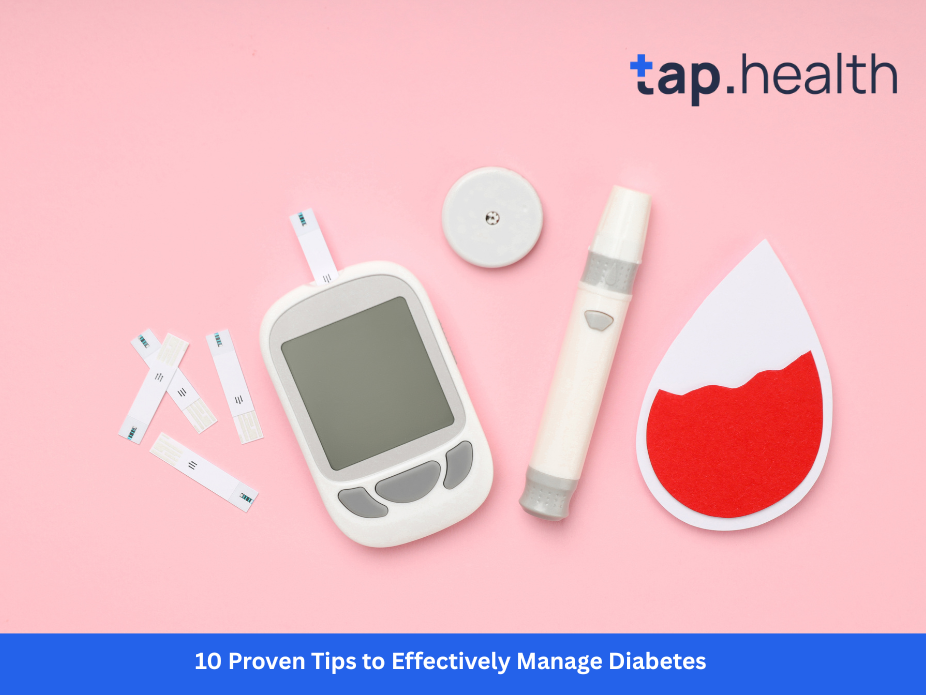Managing diabetes may seem challenging, but with the right strategies, you can take control of your health and prevent complications. From dietary adjustments to stress management, this guide covers 10 proven tips that will help you manage diabetes effectively. By adopting these lifestyle changes and working with your healthcare team, you can live a full, healthy life.
1. Understand Your Diabetes
Know the Type of Diabetes You Have
Understanding the type of diabetes you have is critical because the management strategies can differ:
- Type 1 Diabetes: This autoimmune condition means your body can’t produce insulin. It usually develops in childhood or adolescence, and people with Type 1 need to take insulin injections for life.
- Type 2 Diabetes: More common and often associated with lifestyle factors, it occurs when the body becomes resistant to insulin or doesnât produce enough. It can be managed with lifestyle changes, medication, or insulin in severe cases.
- Gestational Diabetes: This temporary condition occurs during pregnancy, affecting blood sugar levels. It usually resolves after childbirth but increases the risk of developing Type 2 diabetes later in life.
Why it matters: Knowing which type of diabetes you have helps in choosing the right treatment plan and lifestyle changes.
2. Monitor Your Blood Sugar Levels Regularly
Use a Glucometer
Blood sugar monitoring helps you understand how your food, exercise, and medication affect your bodyâs insulin response. A glucometer is a portable device that measures your blood sugar levels. Regular monitoring helps you:
- Track how different foods and activities affect your blood sugar.
- Adjust your treatment or diet based on your readings.
- Prevent blood sugar spikes or dips that can lead to serious complications.
When to check:
- Before meals and snacks: This helps you gauge how your body is responding to food.
- After meals: To understand how your body processes the meal.
- Before bed: Helps in preventing overnight high or low blood sugar levels.
Why it matters: Regular monitoring is key to understanding your condition and adjusting your treatment plan for optimal control.
3. Eat a Balanced Diet
Follow a Healthy, Carb-Controlled Meal Plan
A well-balanced diet is essential for managing blood sugar. Focus on the following:
- Carbohydrates: Pay attention to the amount and type of carbs you eat. Foods high in carbohydrates like bread, rice, and pasta can raise blood sugar levels. Opt for complex carbs like whole grains, which are digested more slowly, keeping blood sugar more stable.
- Fiber-rich foods: Vegetables, fruits, legumes, and whole grains help control blood sugar. Fiber slows down the absorption of sugar into the bloodstream, preventing spikes in blood glucose levels.
- Protein: Lean protein sources, such as chicken, fish, and tofu, can help stabilize blood sugar and provide long-lasting energy without spiking glucose.
- Healthy fats: Include sources of healthy fats like olive oil, nuts, and avocados to improve insulin sensitivity and reduce inflammation.
Avoid or limit:
- Processed foods: Foods high in refined sugars, trans fats, and refined flour can cause sharp spikes in blood sugar.
- Sugary beverages: Drinks like soda, fruit juices, and sugary coffees can rapidly increase blood glucose levels.
Why it matters: A balanced, nutrient-rich diet helps control blood sugar levels and lowers the risk of diabetes complications, including heart disease, nerve damage, and kidney problems.
4. Stay Physically Active
Exercise Regularly to Improve Insulin Sensitivity
Exercise plays a key role in managing diabetes. Regular physical activity helps your body use insulin more efficiently, which lowers blood sugar. The American Diabetes Association recommends the following:
- Aerobic exercise: Activities like walking, running, swimming, or cycling increase your heart rate and help lower blood sugar. Aim for 150 minutes of moderate exercise per week.
- Strength training: Lifting weights or doing resistance exercises improves insulin sensitivity and builds muscle, which can help lower blood sugar over time.
- Daily movement: Aim for 30 minutes of movement every day. Even simple activities like walking after meals can significantly improve blood sugar control.
Why it matters: Exercise improves blood circulation, enhances insulin sensitivity, and lowers the risk of heart disease, a common complication of diabetes.
5. Manage Stress Effectively
Practice Stress-Reducing Activities
Stress can raise blood sugar levels, as the body releases hormones like cortisol and adrenaline during stressful times. Over time, chronic stress can lead to insulin resistance and elevated blood sugar levels.
- Relaxation techniques: Yoga, meditation, deep breathing exercises, or mindfulness can help reduce stress and lower blood sugar levels.
- Adequate sleep: Lack of sleep can worsen insulin resistance, so make sure to get 7-9 hours of sleep per night.
- Stay organized: Reduce stress by staying organized with your daily routine, including exercise, meals, and medication.
Why it matters: Managing stress lowers cortisol levels and helps keep blood sugar levels stable, which is crucial for diabetes control.
6. Take Your Medications as Prescribed
Follow Your Doctorâs Instructions
Whether you have Type 1 or Type 2 diabetes, taking your medication as prescribed is critical to keeping your blood sugar levels within a healthy range.
- Type 1 diabetes: Insulin is the cornerstone of treatment. You may need to take it multiple times a day via injection or an insulin pump.
- Type 2 diabetes: You may be prescribed oral medications like metformin or other diabetes drugs to help your body respond better to insulin. In some cases, insulin injections may also be needed.
Why it matters: Skipping doses or incorrectly adjusting your medication can lead to blood sugar levels that are too high or too low, increasing the risk of complications.
7. Maintain a Healthy Weight
Aim for a Healthy BMI
Maintaining a healthy weight is one of the best ways to improve blood sugar control. Excess weight, especially abdominal fat, can make it harder for your body to use insulin effectively.
- Small weight loss goals: Losing just 5-10% of your body weight can improve insulin sensitivity and reduce the risk of complications.
- Healthy eating and exercise: Focus on nutrient-dense, low-calorie foods and combine them with regular exercise for optimal weight loss.
Why it matters: Maintaining a healthy weight reduces insulin resistance, lowers the risk of heart disease, and improves blood sugar control.
8. Stay Hydrated
Drink Plenty of Water
Staying hydrated helps the kidneys flush out excess sugar from the bloodstream. Drinking plenty of water also helps prevent dehydration, a common issue when blood sugar levels are too high.
- Aim for 8 cups of water per day, or more if youâre active or live in a hot climate.
- Avoid sugary drinks: They can cause blood sugar spikes. Stick to water, unsweetened tea, or herbal infusions.
Why it matters: Proper hydration supports kidney function, helps regulate blood sugar, and prevents dehydration associated with high blood sugar levels.
9. Regular Checkups with Your Healthcare Provider
Monitor Complications Early
Regular checkups allow your doctor to monitor your diabetes and check for complications such as heart disease, kidney disease, and nerve damage.
- A1C test: This blood test measures your average blood sugar levels over the past 2-3 months. The goal for most people with diabetes is to keep the A1C below 7%.
- Kidney function tests: Diabetes can affect kidney function, so regular testing is essential to catch problems early.
- Eye exams: Regular eye exams can help detect early signs of diabetic retinopathy, a condition that can lead to blindness.
Why it matters: Early detection of complications allows for treatment before they become serious, improving your long-term health and quality of life.
10. Educate Yourself About Diabetes
Learn About Your Condition and Management
Understanding diabetes and how to manage it is empowering. Knowledge helps you make better decisions about your lifestyle, meal planning, exercise, and medication.
- Attend diabetes education classes: Many healthcare providers offer programs that teach you how to live with diabetes.
- Use diabetes apps: Technology can help you track your food, exercise, blood sugar, and medication. Apps like MySugr or Glucose Buddy can make it easier to stay on top of your health.
Why it matters: Education increases your ability to manage diabetes independently, giving you control over your health and empowering you to make informed decisions.
FAQ Section
1. How often should I check my blood sugar levels?
It depends on your treatment plan. Typically, you should check your blood sugar levels before and after meals and before bed. Your doctor will provide specific guidance.
2. Can stress affect my blood sugar?
Yes, stress can raise blood sugar levels. The body’s stress response releases hormones like cortisol that can increase glucose production. Practicing stress management techniques like yoga or deep breathing can help control this.
3. What is the best diet for diabetes?
A healthy, balanced diet rich in fiber, lean proteins, healthy fats, and low-GI carbohydrates is best for managing blood sugar. Focus on vegetables, whole grains, and foods with a low glycemic index to keep blood sugar stable.
4. How much exercise do I need for diabetes management?
Aim for 150 minutes of moderate-intensity exercise per week. Activities like walking, swimming, or cycling can help improve blood sugar control and insulin sensitivity.
5. How can I manage my weight with diabetes?
Eat a balanced diet, control portion sizes, and stay active. Even modest weight loss (5-10% of your body weight) can improve blood sugar levels and reduce the risk of complications.
6. Should I avoid all sugar if I have diabetes?
Itâs not necessary to avoid all sugar, but itâs important to limit sugary foods and drinks. Choose healthier snacks, and always balance your meals with proteins and healthy fats to avoid blood sugar spikes.
Conclusion
Effectively managing diabetes is about making informed choices and taking small, consistent steps. By following these 10 proven tips, you can reduce your risk of complications, feel better every day, and live a healthy life. Stay informed, stay active, and work closely with your healthcare team for the best results.



